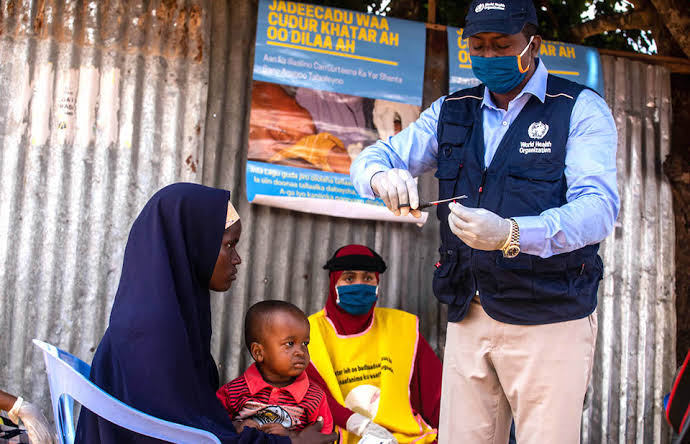Facebook Twitter (X) Instagram Somali Magazine - People's Magazine
Somalia celebrated Universal Health Coverage Day (UHCD) with a focus on improving access to healthcare for its population, including those in remote regions. The event, held at the National Museum of Somalia in Mogadishu, brought together government officials, international organizations, healthcare professionals, and civil society members to address the urgent need for universal health coverage (UHC) in the country.
“Achieving universal health coverage is undoubtedly challenging for Somalia, given the low service coverage index of 27 out of 100,” said Dr. Ahmed Adam Mohamed, Senior Adviser for Health System Strengthening at the Ministry of Health. Despite these challenges, there is a collective effort by the government, international organizations, and citizens to move toward UHC.
Somalia’s Healthcare Landscape
The healthcare system in Somalia faces significant hurdles, including limited infrastructure, conflicts, climate change, and insufficient funding. Somalia has one of the highest maternal mortality rates globally, with 692 deaths per 100,000 live births. These statistics highlight the dire need for a robust and inclusive healthcare framework.
Dr. Marina Madeo, a Health Policy Advisor with the World Health Organization (WHO), emphasized, “There is commitment from all stakeholders to improve healthcare systems, but the journey is long.”
Collaboration for Awareness
The UHCD event was co-organized by Somalia’s Ministry of Health, the WHO, and the United Nations Transitional Mission in Somalia (UNTMIS). The theme for this year centered on ensuring governments provide accessible, acceptable, and quality healthcare. Kirsten Young, Chief of UNTMIS’s Human Rights and Protection Group, stressed the importance of delivering healthcare information in multiple Somali dialects to ensure inclusivity.
“Art and language are powerful tools for spreading awareness about healthcare,” Young noted, emphasizing the need to communicate effectively with Somalia’s diverse population.
The Role of Education and Culture
The National Museum of Somalia played a unique role in this campaign, hosting discussions and showcasing materials in various dialects. Dr. Osman Gedow Amir, the museum’s director, highlighted its importance as a space for public education. “The museum’s role is to sensitize the public about their rights and access to healthcare,” he said.
SIMAD University’s Deputy Rector for Research and Consultancy, Dr. Najib Isse Dirie, called for sustained efforts to close the healthcare access gap. “The world is moving towards universal health coverage, and Somalia must not be left behind,” he added.
Overcoming Barriers
Remote communities in Somalia often face the greatest challenges in accessing healthcare. Lack of information and infrastructure exacerbates these issues. The Ministry of Health, in collaboration with international partners, aims to make healthcare accessible to all through increased awareness, resource allocation, and policy reforms.
Participants at the UHCD event suggested translating healthcare information into Somali dialects, including the Barawani dialect, to ensure inclusivity. Safiya Jeylaani, a resident of Barawe, appreciated these efforts: “I’m glad this initiative includes my dialect. It ensures everyone can understand and benefit.”
A Global Perspective on UHC
Universal Health Coverage Day commemorates the United Nations’ 2012 endorsement of UHC as a fundamental right. UHC aims to provide equitable healthcare access and protect individuals from impoverishing medical expenses.
The WHO states that healthier populations contribute to resilient and productive societies. However, more than half of the world’s population lacks access to essential healthcare services, highlighting the need for increased governmental investment in healthcare.
A Path Forward for Somalia
Somalia’s commitment to universal health coverage reflects its determination to improve the health and well-being of its citizens. Collaborative efforts between government entities, international organizations, and civil society will be pivotal in overcoming barriers and ensuring no one is left behind.

